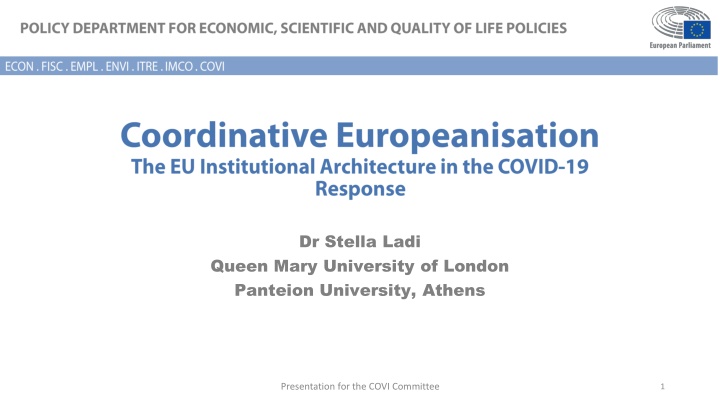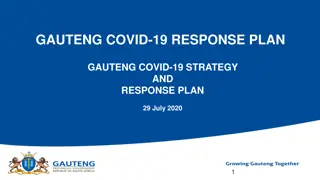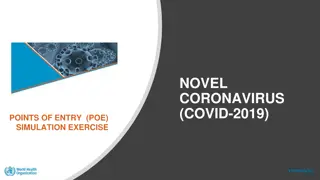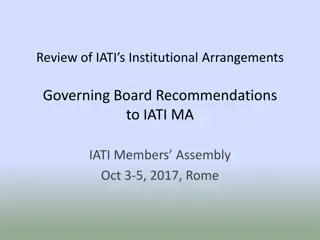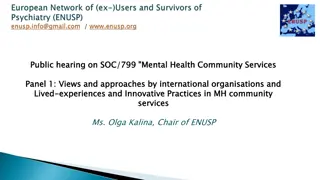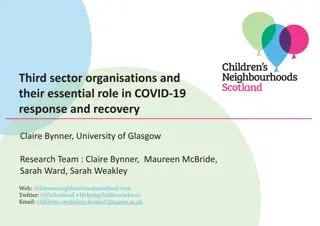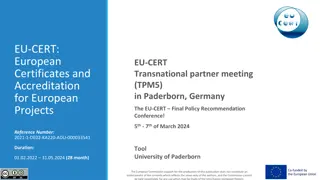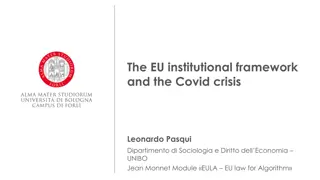European Institutional Response to COVID-19: Coordinative Europeanisation and Policy Recommendations
Dr. Stella Ladi from Queen Mary University of London and Panteion University, Athens, presented on the Coordinative Europeanisation during poly-crisis and the EU's institutional response to COVID-19. The presentation highlighted the recovery and resilience facility, the Schengen Area, and the importance of a coordinated European response to the crisis to address various policy areas. It discussed the involvement of Member States in policy-making processes, the role of institutions like the European Council and Commission, and the public's expectation of a European solution. The presentation emphasized the need for deeper interdependence understanding and innovative initiatives in facing crises.
Download Presentation

Please find below an Image/Link to download the presentation.
The content on the website is provided AS IS for your information and personal use only. It may not be sold, licensed, or shared on other websites without obtaining consent from the author.If you encounter any issues during the download, it is possible that the publisher has removed the file from their server.
You are allowed to download the files provided on this website for personal or commercial use, subject to the condition that they are used lawfully. All files are the property of their respective owners.
The content on the website is provided AS IS for your information and personal use only. It may not be sold, licensed, or shared on other websites without obtaining consent from the author.
E N D
Presentation Transcript
Dr Stella Ladi Queen Mary University of London Panteion University, Athens Presentation for the COVI Committee 1
1. Coordinative Europeanisation during poly-crisis 2. EU s Institutional Response during COVID-19 (I) 3. EU s Institutional Response during COVID-19 (II) 4. The Recovery and Resilience Facility 5. The Schengen Area 6. Conclusions Policy recommendations 2
The COVID-19 crisis gave signal of the permanency of emergency in Europe the war on Ukraine confirmed it Coordinative Coordinative Europeanisation Europeanisation: : A bottom-up process where the Member States are actively involved in the policy- making process early on in order to guarantee the highest level of implementation possible Involvement is often informal and online Deeper understanding of interdependence Solutions are often good enough Presentation for the COVI Committee 3
Slow at the beginning because of uncoordinated response and because of change in pattern of work but eventual speeding up in various areas: RRF, vaccines strategy, etc. Response had to be horizontal and touch upon different policy areas (not only a health crisis but also an economic crisis, borders crisis, etc.) All institutions and different DGs had to be involved The public opinion in EU Member States expected a European solution, turning COVID-19 into an existential crisis for the European project. 4
Coordinating role of the European Council has been central, similarly to other crises. The European Commission has also been central with the increase of powers and day-to-day management but also because of: Brussels reaching out to the national capitals via online meetings (Commission- Capital networks) The Council Council of of Ministers Ministers found it harder to adjust and most of the work took place at the COREPER The European European Parliament Parliament also had a harder time adjusting but played an important role in the negotiation of the MFF and as a result the RRF Presentation for the COVI Committee 5
Co-ordinated response to the economic crisis via initiatives early on (SURE, PEPP) evidence of inter-crisis learning from the Eurozone crisis The more ambitious/innovative New Generation EU has been the outcome of a Franco-German agreement and based on a Commission proposal 750 billion euro mixing grants and loans and linked to the MMF Commission for the first time borrows from markets Coordinative characteristic both at the decision-making phase and at the implementation: Co-decision of NRRPs with co-created conditionality but rule of law conditionality (negative conditionality) Only EU institutions involvement no IMF Reforms stem from the European Semester Presentation for the COVI Committee 6
To start with the closure of borders was uncoordinated with the power in the hands of Member States because of health emergency The Commission had to mobilise a functional solidarity discourse for green lanes to be established and for coordination to be restored From 2020 a coordinative response which led to the vaccination passports in 2021 Central role for the ECDC that was providing data on COVID-19 - involvement of health ministers in the decisions Coordination took place voluntarily and by avoiding a debate on Schengen governance and reform Presentation for the COVI Committee 7
The nature of the crisis (existential and threat to human life) was central in leading to quick solutions learning from previous crises (coercion and good practices not enough) Coordination during the crisis between Member States (capitals) and the EU institutions at an early stage is central in order to have solutions that can be implemented and produce immediate results. Foresight and strategic crisis management are central for future preparedness (see Chief Scientific Advisors Report, 2022) Critical infrastructure and institutions (e.g. national health systems, ECDC, HERA) need to be strengthened and be closely connected to be able to respond to future health crises. Presentation for the COVI Committee 8
Dr Stella Ladi Queen Mary University of London Panteion University, Athens Presentation for the COVI Committee 9
